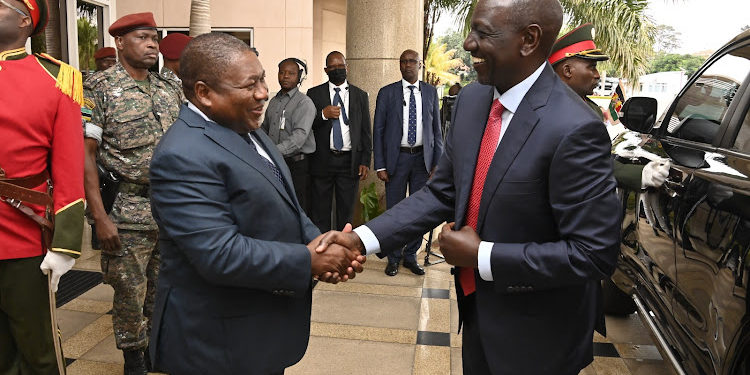In a significant move to bolster economic ties and foster mutual development, Kenya and Mozambique have sealed eight cooperative agreements, marking a pivotal milestone in their bilateral relations. President William Ruto and his counterpart President Filipe Nyusi signed the pacts during Ruto’s two-day state visit to Mozambique. The pacts, signed across various sectors, signify a resolute commitment to shared prosperity and deeper collaboration between the two African nations.
Read more: Kenya and Comoros Sign a General Cooperation Agreement to Boost Economic Ties
The agreements cover Legal Aid, Diplomacy and Public Service Training, Investment Promotion, Blue Economy, and Driver’s License Mutual Recognition exemplifying a strategic vision for sustainable growth and development. One of the key highlights is the establishment of a joint trade commission aimed at facilitating smoother cross-border trade and reducing trade barriers.
President Ruto explained that his visit was made to correct the current trade imbalance between the two countries. He explained that between 2018 and 2022, Kenya’s imports increased by 62.5% to Kshs. 5.2 bn in 2022, up from Kshs. 3.2 bn in 2018, while exports grew by 16.7% to Kshs. 1.4 bn in 2022 from Kshs. 1.2 bn in 2018.
The agricultural partnership aims to promote food security through the exchange of best practices in farming techniques and technology adoption. Additionally, collaborative efforts in tourism promotion are poised to unlock the immense potential of both nations’ rich cultural heritage and natural attractions, boosting their tourism sectors.
Read more: Kenya Seeks Closer Ties with China to Boost Economic Growth
By forging stronger ties in education and technology, Kenya and Mozambique are poised to benefit from knowledge transfer and skill development. These cooperative ventures lay the foundation for long-term sustainable growth and open doors for further investment and joint ventures between businesses in the two countries.
The newfound synergy between Kenya and Mozambique underscores the importance of collaboration in driving economic progress in Africa. As these agreements take root and transform into tangible actions, they have the potential to create a more robust and correct trade balance to create a win-win situation for both countries.


















